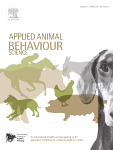Document type : Scientific journal published in Applied Animal Behaviour Science
Authors: Jo Hockenhull, Tamzin Furtado
Preview: Traditionally, UK equines are kept in "gilded cages"; sanitised spaces which aim to provide every comfort, whilst shielding the horse from any form of harm or distress. Horses are typically provided with a "bedroom"; a private space where they may rest on a comfortable clean bed, wear fashionable and warm clothing, enjoy plentiful food, and perhaps play with some toys. These safe spaces may extend to the provision of individually isolated turnout in relatively small, sterile squares of grass. Yet, these spaces are a far cry from the natural lifestyle of the horse. Horses are grazing animals which would naturally live in herds and cover wide spaces while seeking food with their herd-mates, and inevitably many horses whose needs are not met display unwanted behaviours such as biting, bucking, or barging. Despite this, the equine community traditionally perceives isolated, comfortable lives as the ideal for horses, often describing them as "living like kings".
The COVID-19 pandemic presented an interesting turning point: during the initial lockdown (March-May 2020), horsepeople themselves experienced life in a gilded cage. Suddenly, the human population was plunged into many of the same conditions which are seen as optimal for our horses; we had to "stay at home", experienced a lack of social contact, restricted movement and, perhaps most importantly, a lack of choice.
In this paper, we review published equine welfare research to compare the ways in which human lockdown reflects standard equine management. We compare the ways in which published literature about human responses to lockdown give insight to common equine management issues, and finally we consider the literature around human-animal relationships during lockdown, and how the culmination of these fields might alter human-equine relationships and equine welfare as we move forward.
These changes have implications for the long-term treatment of equines in the UK, as well as for other companion animals who traditionally live their lives in "gilded cages".



